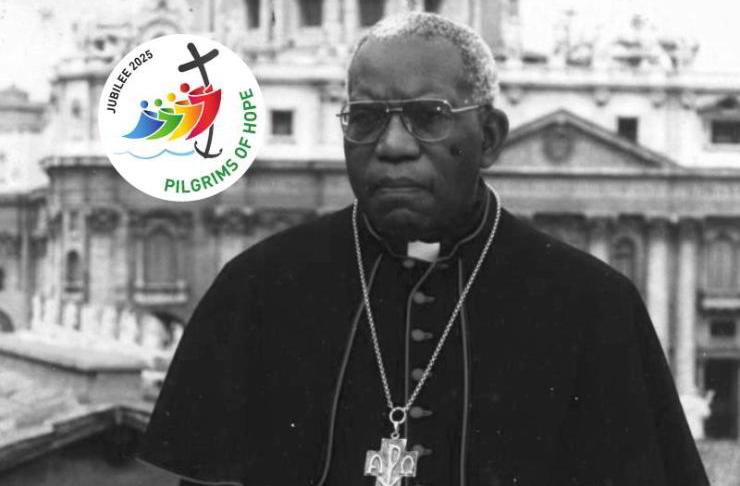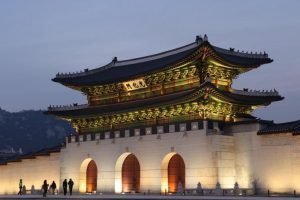On October 23, 1996, in Bukavu, he was captured by the forces of the AFDL (Alliance of Democratic Forces for the Liberation of Congo) of Laurent Kabila. The rebels killed him. The streets were deserted, people were holed up in their houses, and corpses lay in the streets of the city. Twenty-nine years later, the streets of Bukavu are still filled with violence and bloodshed.
Mgr. Christophe Munzihirwa was born in 1926 in Lukumbo, a small village in South Kivu, in the eastern region of what is now the Democratic Republic of Congo (DRC). A parish priest at the cathedral of Bukavu in the early 1960s, he joined the Jesuits in 1963 and moved to Belgium to study social sciences and economics at the University of Leuven. He returned to the Congo in 1969 and his ministry soon became that of a “man for difficult situations”.
When Mobutu ordered all students and seminarians to serve in the army for two years in 1971, Father Christophe joined the army as a sergeant.
From 1980 to 1986 he was provincial of the Jesuits in Central Africa (Rwanda, Congo, Burundi). On November 9, 1986, he was consecrated bishop and sent to Kosongo as coadjutor of Mgr Timothée Pirigisha.
From the beginning of the 90’s he was apostolic vicar of Bukavu and in 1994 he became archbishop. In those difficult years for the Congo, he participated with compassion in the tragedy of the people of the Great Lakes region, as a man who truly loves his neighbour.
After the Rwandan genocide in 1994, Mgr. Munzihiwa became a true advocate for the thousands of Hutu refugees who flooded his diocese. He firmly believed that only a few had committed atrocities against the Tutsis and that most were innocent victims. He spoke with an evangelical voice, calling for reconciliation beyond ethnicity.
Faced with this tragedy, he said: “In these days, when mass graves are still being dug, when misery and disease can be found for several thousand kilometres, on the roads and paths, in the fields, we are disturbed by Christ’s cry from the cross: “Father, forgive them”. God’s mercy, which breaks the chain of revenge, calls for a change in everyone, whatever faction they belong to. It is the only thing capable of breaking once and for all the infernal spiral of revenge”.
Many compared him to Oscar Romero, bishop and martyr El Salvador. When Munzihirwa was a bishop in Kasongo and Mobutu ordered to loot the city, believing that some rebel soldiers found shelter there, the bishop said: “I see soldiers before me, I see the colonel. Stop oppressing the people. I ask you, I order you: stop!” The commander wanted to arrest him and he fearlessly said: “I am ready, arrest me”.
His commitment, his passion and his love for the people turned him into a problem for those in power, due to his outright opposition to every form of violence and also for his absolute dedication to others and his permanent search for the truth.
In Bukavu, those were days of death and anguish. The military and civilian authorities of the eastern Kivu region, the last remnants of Mobutu Sese Seko’s dictatorship left the city in the hand of Rwandan soldiers who killed whoever was in sight. The perpetrators were members of the Rwandan Tutsi minority, who accused Mobutu of giving shelter to several thousand militiamen among the Hutu refugees.
On 23 October 1996, Mgr. Munzihirwa is savagely murdered in his town. His body was found in a small square named Nyawera. The rebels had killed all those who were passing by, both on foot and in their car.
Exactly one week earlier, after a declaration on the real conditions of the region and the betrayal of the Congolese authorities, the Archbishop said: “Today I’ve forfeited my life. I’ve signed my death sentence”. His martyrdom was not sudden but the result of a personal itinerary, of a total faith in his Lord, of a constant and hard search, of a testimony which resulted in giving his life. He said that a Christian must bear witness of his faith, he must “give” even when facing “the most hopeless human tragedies, because there is not a moment in which the Gospel can be put aside. It is the only way in which the life of a Christian can become a sign of hope”.
Twenty-nine years have passed since the murder of Mgr. Munzihirwa. A new wave of violence has begun. Last February, the M23 rebels, supported by Rwanda, entered Bukavu. In recent weeks, hundreds of thousands of people have been forced from their homes and thousands have been killed as the rebels advance.









